The last national security adviser of the Obama administration claimed that a newly declassified email showed no discussions of law enforcement matters took place.
The email “makes clear that no discussion of law enforcement matters or investigations took place, despite dishonest accusations to the contrary,” Erin Pelton, a former government spokeswoman, said in a statement on behalf of Susan Rice.





